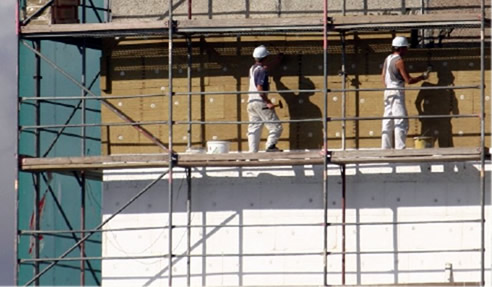The Ban on Lightweight Expanded Polystyrene Sheets for Cladding by Foamex

The integrity of lightweight expanded polystyrene sheets has come into question, 11 months after a fatal fire struck the Grenfell Tower in West London. Investigations later revealed that the building's external cladding, made of aluminium composite panels, was the possible cause. The same material was also held responsible for the 2014 Lacrosse Tower fire in Melbourne's Docklands.
Since then, State government and local city councils have been grappling with the issue of combustible cladding materials. The Australian Senate Standing Committee on Economics released an interim report prohibiting the use of aluminium composite panels with a polyethylene core of more than 30 percent, as well as expanded polystyrene sheets, on multi-storey buildings.
The Victorian Building Authority responded to the new measures by issuing product safety alerts to ban the use of aluminium composite panels, lightweight expanded polystyrene sheets and other combustible cladding materials in buildings above three storeys.
Foamex Reacts to the Prohibition of Lightweight Expanded Polystyrene Sheets for Cladding
Foamex is one of the industry leaders responsible for the development and innovation of lightweight expanded polystyrene sheets in Australia. They are also a committed member of Expanded Polystyrene Australia (EPSA), the governing body for all manufacturers and distributors of expanded polystyrene sheets products across Australia.

EPSA offer its support for enhanced public safety through the pursuit of building standards and policies on flammable cladding materials. However, EPSA clarified through an appeal sent to the Victorian Minister for Planning, that polyethylene has no connection to the expanded polystyrene sheets manufactured and distributed by its members.
EPSA also teams up with other international associations, such as EUMEPS (Europe), AMEPS (Asia) and EPSIA (USA), to be in line with the latest technological processes, regulatory developments and concurrent fire-risk factors necessary for manufacturing lightweight expanded polystyrene sheets for cladding.
Why are Foamex Lightweight Expanded Polystyrene Sheets for Cladding Safe?
Foamex strictly conforms to the rules and regulations imposed by EPSA. This includes adding flame retardant additives during the production, doing compliance tests, and supplying only flame-retardant grades of expanded polystyrene sheets for residential, commercial and industrial applications.
Fire Properties
All polystyrene product range from Foamex is reinforced with flame-retardant additives, which means it will self-extinguish upon contact with flame.
Long-Term R-Value
This talks about the capacity of expanded polystyrene sheets to resist heat flow. The Foamex product range is produced in accordance with the seven grades of AS 1366.3-1992. The grades pertain to the product density and how it affects the structural stability, strength and thermal resistance. In short, the higher the R-value, the greater the insulating power.
Moisture
The closed cellular matrix of expanded polystyrene enables it to retain its thermal value and function even after prolonged exposure to water saturation. Thus, maintaining its R-value and energy saving capacity.
Avoid confusion and fear mongering! Schedule an appointment with the experts at Foamex and learn more about the safety features and benefits of lightweight expanded polystyrene sheets for cladding today! Call 02 9773 1655 or visit www.foamex.com.au.

|





 Waffle Pod Void Formers - Diamond Pod by
Waffle Pod Void Formers - Diamond Pod by Polystyrene Foam Blocks for Cool Rooms
Polystyrene Foam Blocks for Cool Rooms Benefits of Recycling Polystyrene Foam
Benefits of Recycling Polystyrene Foam Oversized EPS Foam for Event Props by
Oversized EPS Foam for Event Props by Versatile Polystyrene Sheets Melbourne
Versatile Polystyrene Sheets Melbourne Lightweight Foam Blocks for Sustainable
Lightweight Foam Blocks for Sustainable Polystyrene Underfloor Insulation Sydney
Polystyrene Underfloor Insulation Sydney Robust Polystyrene Blocks for Tunnel
Robust Polystyrene Blocks for Tunnel XPS Slab Edge Insulation for Residential
XPS Slab Edge Insulation for Residential Foam Insulation to Lower Your Carbon
Foam Insulation to Lower Your Carbon Reduce Energy Bills with Rigid
Reduce Energy Bills with Rigid Polystyrene Waste Disposal Guidelines by
Polystyrene Waste Disposal Guidelines by EPS Foam Insulation for Garage Doors
EPS Foam Insulation for Garage Doors Superior Underfloor Insulation for Wood
Superior Underfloor Insulation for Wood XPS Insulation for Energy Efficient
XPS Insulation for Energy Efficient Extruded Polystyrene Foam for
Extruded Polystyrene Foam for Trust Foamex for Polystyrene Foam Block
Trust Foamex for Polystyrene Foam Block Waffle Pod Slabs for Sustainable Homes
Waffle Pod Slabs for Sustainable Homes Polystyrene Foam Packaging for Shipping
Polystyrene Foam Packaging for Shipping Foam Insulation for Draught-free Home by
Foam Insulation for Draught-free Home by
